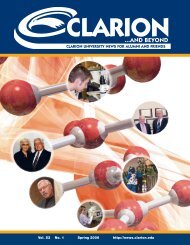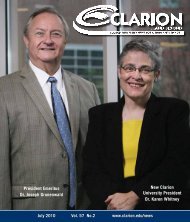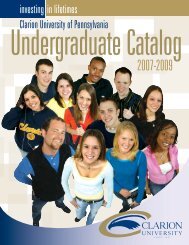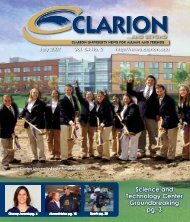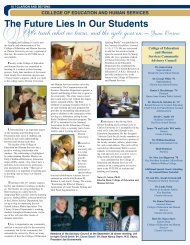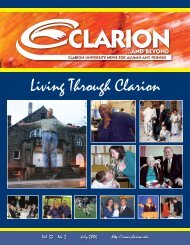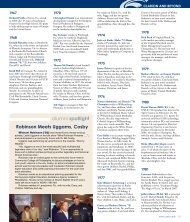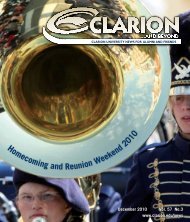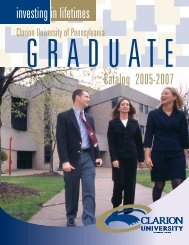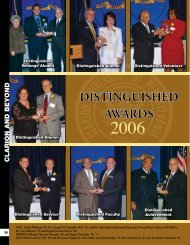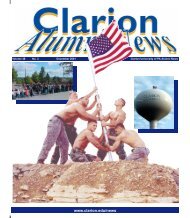Graduate - Clarion University
Graduate - Clarion University
Graduate - Clarion University
- No tags were found...
You also want an ePaper? Increase the reach of your titles
YUMPU automatically turns print PDFs into web optimized ePapers that Google loves.
<strong>Clarion</strong> <strong>University</strong> of Pennsylvania 87requirements or other internship or apprenticeship maynot hold a graduate assistantship during the semester oftheir student teaching.Physical FacilitiesThe Department of Special Education and RehabilitativeSciences is housed in a two-story wing of Stevens Hall onthe <strong>Clarion</strong> Campus. In addition to the modern classrooms,an array of instructional support technology is available.In addition to the numerous computer labs across thecampus, there is a computer lab in Stevens Hall andanother in the Department of Special Education andRehabilitative Sciences. In the lab, students have accessto a variety of instructional and management softwarealong with IBM and MAC hardware and adaptivecommunication devices for computer and stand-alonedevices. Students have access to mainframe computersupport through the campus systems.Rehabilitative Sciences CoursesThe department maintains ongoing cooperative relationswith numerous school districts, Intermediate Units, andrehabilitation programs in the region, all of which are availableto assist in providing a wide array of field opportunities.Release of Data from M.S.Thesis-Publication PolicyIn accordance with professional ethics, anyinformation from master’s research should be published orotherwise released only in conjunction with the student’sadvisor. Publications resulting from research done at<strong>Clarion</strong> <strong>University</strong> shall give appropriate credit to personsinvolved in the research, to <strong>Clarion</strong> <strong>University</strong>, and toany granting agencies which supported the research.A maximum of six credits from the 400-level courses listed below can be taken for graduate credit with specialpermission from the graduate program coordinator or department chair. 400-level courses taken for undergraduatecredit cannot be repeated for graduate credit.Rehabilitative Sciences/Special EducationREHB 405: Substance Abuse 3 s.h.Participants study the physiological and psychological implication of drug or alcohol abuse, over-medication, and drugdependence emphasizing intervention, advocacy, treatment, and prevention. Fall semester.REHB 410: Prevention and Treatment Strategies in Substance Abuse 3 s.h.Participants engage in the study of societal pressures, attempts to prevent substance abuse, and treatment strategies alongwith comparative analysis of efficacy. Prerequisite: REHB 405. Spring semester.REHB 510: Group Process in Rehabilitation 3 s.h.Participants engage in the study of group development, dynamics, theory, leadership styles, participant roles, techniques,and evaluation of effectiveness as applied to rehabilitative services contexts.REHB 520: Research in Rehabilitative Sciences 3 s.h.Provides the essential knowledge and skills required to be both critical consumers and producers or researchers inrehabilitative sciences. Students are introduced to all phases of quantitative and qualitative research design, analysis, andevaluation. Applicable ethical standards of practice as specified by the Council on Rehabilitation Education are emphasizedthroughout.REHB 530: Aging and the Human Services 3 s.h.Provides information related to older adult care management from the framework of human services systems. Conceptsof client triage, assessment, planning, and brokering will be reviewed within the context of identifying problems associatedwith aging, identifying components of human services delivery systems, and case management skill development. Prerequisite:REHB 250.REHB 537: Lifestyle and Career Development 3 s.h.Participants engage in the analysis of economic, social, and psychological factors which define the context of educational,vocational, and personal decision-making; decision-making related to vocational development; the role of information infacilitating decision-making; and the varieties of information, resources, and types of access available.REHB 545: Rehabilitation: Philosophy and Principles 3 s.h.Participants engage in the analysis of the values, assumptions, and the principles underlying theories of rehabilitation andtheir relation to the goals and objectives of rehabilitation programs.REHB 550: Issues in Rural Human Services 3 s.h.Explores the field of human services delivery and behavioral health care issues in rural environments including mentalhealth care, gerontology, substance abuse, education, vocational rehabilitation, disability, poverty, and the criminal justicesystem. The course encompasses the various definitions of rural, diversity of rural communities, the common challenges facedand the professional skills needed by rural practitioners.



